Stewardship of our Ocean through the International Seabed Authority

The challenges facing our ocean demand more than fragmented solutions and multilateralism remains our most powerful tool. Our ocean covers more than 71 per cent of the plant’s surface yet sustains all of it. Ahead of the third UN Ocean Conference (UNOC), UN Secretary-General, António Guterres reinforced that we are at a critical juncture to renew the world’s collective promise to the ocean and that we must sustain what sustains us. Effective ocean governance is not an abstract concept; it is a necessity. The UN Convention on the Law of the Sea (UNCLOS), provides the legal certainty and institutional framework for all States to work together, in good faith towards a common cause. This sentiment strongly resonated in all the engagements that we, as the international Seabed Authority, took part in at the recent third UNOC in Nice, France.
The deep seabed beyond national jurisdiction—referred to as “the Area”—covers 54% of the world’s oceans. Under UNCLOS, the Area and its resources are declared the common heritage of humankind. This principle enshrines global equity, environmental responsibility, and intergenerational justice. Established by UNCLOS in 1994, the International Seabed Authority is the only intergovernmental body mandated to manage mineral resources in the Area. With 169 Member States and the European Union, ISA embodies inclusive multilateralism in action.
ISA’s work also supports the implementation of SDG 14, the post-2020 Global Biodiversity Framework, the 2030 Agenda, and complements efforts under the Biodiversity Beyond National Jurisdiction (BBNJ) Agreement. Looking back, ISA has helped the world avoid a “gold rush” for deep sea mineral resources through its comprehensive framework that regulates seabed exploration while promoting marine scientific research, environmental protection, and capacity development. Through legal instruments, environmental standards, and a growing network of protected areas—including over 1.9 million square kilometres of the Clarion-Clipperton Zone already designated as off-limits to exploitation—ISA is building foundations for the consideration of seabed resource use in the future; use that is anchored in equitable and sustainable management.
Looking forward, ISA can realise the potential for sustainable blue economic activities through sustained cooperation, sound institutions, and fair rules. As the UN Secretary-General recently stated at UNOC, “The deep seabed cannot become the Wild West.”. No single State can claim or exploit it unilaterally. The benefits must be shared by all, with special consideration for Developing States.
It is only through cooperation that we can deliver meaningful outcomes for people and planet, particularly in areas beyond national jurisdiction, where no single State bears sovereignty but all share responsibility. To this end, we need to bring the ocean agenda closer to national development strategies and unleash the potential of the ocean for accelerating the SDGs by:
- Encouraging the ratification of UNCLOS and an active participation in the ISA’s decision-making structures;
- Promoting that national delegations contribute and participate in the development of the ISA Mining Code that will govern future exploitation of seabed minerals and the sharing of benefits, bringing national experiences and expertise;
- Connecting governments, universities, and national agencies with the opportunities for developing countries that ISA provides on marine scientific research and capacity development; and
- Supporting governments with policy alternatives and economically viable pathways for sustainable development that steers away from deep sea mining
The UN’s role in these efforts remains vital.
As the UN Secretary-General’s representatives in 132 developing countries, UN Resident Coordinators are uniquely well positioned to undertake this policy advocacy at the national level and help ensure that the seabed never becomes the Wild West. With a mandate to ensure that the UN development system offers the host government a strategic, coherent and impactful package of support to realise the national priorities and the SDGs, Resident Coordinators can rally the breadth of expertise in their UN Country Teams and act as effective instruments to turn the discussions at the Ocean Conference into national policy and action.
As we move forward, these national efforts must also be complemented by the engagement of UN Teams at regional and global levels to ensuring that our ocean accelerates us to a fairer and more sustainable world. Let us dive deeper—together—to reach higher goals.
[For more information on ISA’s capacity development, marine scientific research, and policy processes, visit: www.isa.org.jm]

